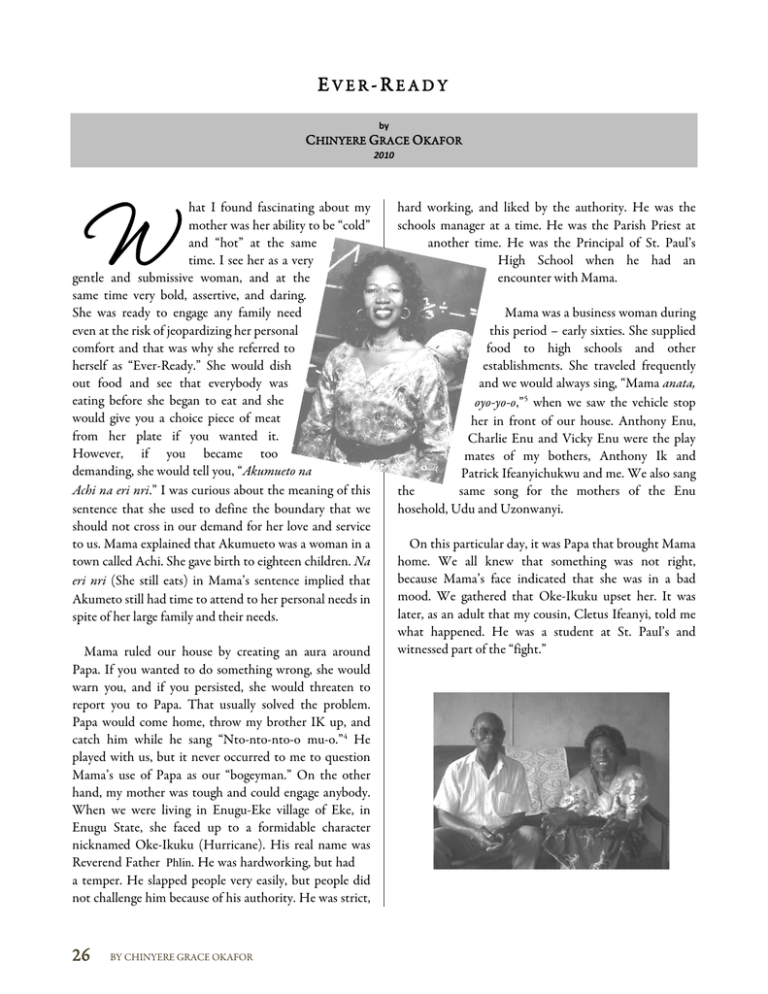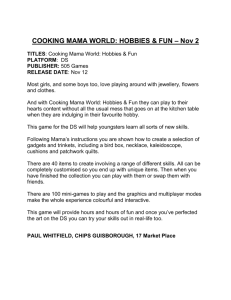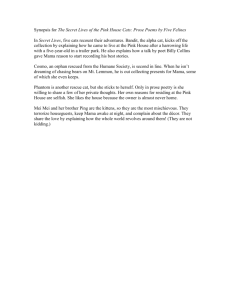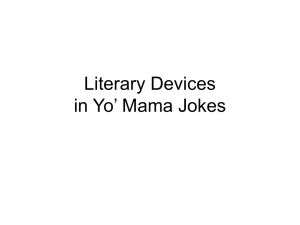E - R V E R
advertisement

EVER-READY W by CHINYERE GRACE OKAFOR hat I found fascinating about my mother was her ability to be “cold” and “hot” at the same time. I see her as a very gentle and submissive woman, and at the same time very bold, assertive, and daring. She was ready to engage any family need even at the risk of jeopardizing her personal comfort and that was why she referred to herself as “Ever-Ready.” She would dish out food and see that everybody was eating before she began to eat and she would give you a choice piece of meat from her plate if you wanted it. However, if you became too demanding, she would tell you, “Akumueto na Achi na eri nri.” I was curious about the meaning of this sentence that she used to define the boundary that we should not cross in our demand for her love and service to us. Mama explained that Akumueto was a woman in a town called Achi. She gave birth to eighteen children. Na eri nri (She still eats) in Mama’s sentence implied that Akumeto still had time to attend to her personal needs in spite of her large family and their needs. Mama ruled our house by creating an aura around Papa. If you wanted to do something wrong, she would warn you, and if you persisted, she would threaten to report you to Papa. That usually solved the problem. Papa would come home, throw my brother IK up, and catch him while he sang “Nto-nto-nto-o mu-o.”4 He played with us, but it never occurred to me to question Mama’s use of Papa as our “bogeyman.” On the other hand, my mother was tough and could engage anybody. When we were living in Enugu-Eke village of Eke, in Enugu State, she faced up to a formidable character nicknamed Oke-Ikuku (Hurricane). His real name was Reverend Father Phlin. He was hardworking, but had a temper. He slapped people very easily, but people did not challenge him because of his authority. He was strict, 26 BY CHINYERE GRACE OKAFOR 2010 hard working, and liked by the authority. He was the schools manager at a time. He was the Parish Priest at another time. He was the Principal of St. Paul’s High School when he had an encounter with Mama. Mama was a business woman during this period – early sixties. She supplied food to high schools and other establishments. She traveled frequently and we would always sing, “Mama anata, oyo-yo-o,”5 when we saw the vehicle stop her in front of our house. Anthony Enu, Charlie Enu and Vicky Enu were the play mates of my bothers, Anthony Ik and Patrick Ifeanyichukwu and me. We also sang the same song for the mothers of the Enu hosehold, Udu and Uzonwanyi. On this particular day, it was Papa that brought Mama home. We all knew that something was not right, because Mama’s face indicated that she was in a bad mood. We gathered that Oke-Ikuku upset her. It was later, as an adult that my cousin, Cletus Ifeanyi, told me what happened. He was a student at St. Paul’s and witnessed part of the “fight.” “That principal was very harsh. He used to flog us because of very minor offences. If he did or said something funny and you laughed; sam! You won’t even know when his hand hit you. And you know, we found the way he spoke very funny, so we got into trouble all the time. If you were late for assembly, forget it. He would use cane to flog you on the buttocks. If you spoke Igbo, his hand would land on your head with a knock. So when we heard that Mama was “fighting” with him, we ran to the Principal’s office to see somebody teach him a lesson for once. Mama was holding a stick and waiting for him because he locked himself inside his office. We went and brought bigger sticks for Mama. But then, Papa’s car arrived and he took Mama away.” This account by Cletus left some questions unanswered. When Mama came for my graduation at the University of Nigeria, Nsukka, she shared many of her stories with me. They had scheduled her for surgery but she had told the doctor to postpone it so that she would attend my graduation. She attended all the ceremonies with me. We went to the award ceremony, Chancellor’s party, the graduation concert, and theater. That was when I asked her about her encounter with the Principal. “He called me a thief. That was it. I gave him an account of what I supplied. He had questions about the price of oil. I told him that the manufacturers hiked the price. He began to complain and then called me a liar and a thief. But when your father asked him about it, he said that he was talking about the manufacturers not me. But I was and I am sure about what I heard. Anyway, even if I wasn’t the one that he called a thief, it was still insulting to call the others thieves. Did he know the process of producing oil?” “So did he hit you or did you hit him?” “I was not one of his teachers or his students. I did not hit him, but I used my mouth. I said, “You are a liar. You are a thief. You mother is a liar. Your father is a thief.” Then I picked one of his sticks to defend myself with in case he hit me. He ran into his office and shut the door. I sat in the general office and told him that I would be there until he came out. I didn’t know that he opened the window and sent his driver to go and call your father.” “It was while I was waiting outside his office that I really became angry. That man had cut my profit margin, but because I didn’t want to lose that line, I accepted his terms. Because I accepted, he then tried to make more cuts. I was losing money but I knew that the price would change and I would regain the money I lost. But for him to talk to me any-how was the limit. While I was outside his office, I realized that people had been waiting for someone who would square up to the man. Do you know that people did not beg me? Usually they would beg you if you want to fight, but not this time. They even gave me bigger sticks. The students were outside cheering. When I saw your father’s car, I began to weep. I knew that there would be no fight. But he learnt a good lesson.” Mama liked to stick out for what was right. If you offended her, she wanted an apology, but I have seen her many times show kindness to an offender. This used to confuse me as a small girl until she explained that one should not juggle all issues together. An example was when one of her adopted daughters, Eunice, left her house and got married without involving family members including her biological parents. Mama was offended by what she regarded as “lack of respect.” However, the young woman had a problem and needed help. She phoned Mama. In 2008, when Eunice had “become good” with her mother and Mama, she told me why she phoned Mama. “I knew that Mama would help me, and she did so immediately, but she still wanted me to do the right thing and show respect to my family. I have seen women that Mama does not know; women we casually met in church. They would come here with one problem or that and Mama would help them. I know women that started their businesses with the money that Mama gave to them. Some of them come here to get ideas from Mama about their trade and sometimes about their family problems. She is always ready to solve problems, ready to reprimand you, ready to sing and dance, ready to pray, ready for any situation. That’s why we call her Ever-Ready.” In Her Own Voice: AGNES OKAFOR TELLS HER STORIES 27



